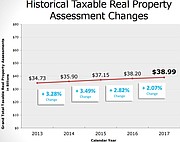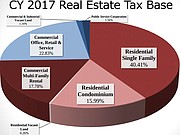The real estate assessments are in, and while the average Alexandria taxpayer will likely be happy to hear the assessments won’t drive their taxes up, the city is left short changed on the eve of an already challenged budget.
Locally assessed real property assessments increased 2.07 percent, or $778.6 million, from 2016 to 2017. The residential tax base saw the slowest growth, with 1.75 percent ($379.8 million) while the city’s commercial tax base increased 2.51 percent ($398.8 million). According to Kendel Taylor, Alexandria’s director of finance, this is the third worst performing change in the tax base since 1996. It is also the lowest tax base increase since the Great Recession in 2009 and 2010.
The average value for a condominium in Alexandria increased by an average 0.16 percent. For a resident in a condominium, average value $310,999, that will mean a $5 increase on the tax bill caused by assessment. The average single-family home value increased by 1.26 percent. For a resident in a single-family home, average value $730,449, that will mean a $97 increase on the tax bill caused by assessment.
Residential property in Alexandria composes 56.7 percent of the real estate tax base, with 43.3 percent being commercial. While the assessments in 2017 brought those numbers a little closer together, Real Estate Assessor William Bryan Page said this was only because multi-family rental housing is classified as commercial rather than residential. If multi-family rental were grouped with the rest of residential housing in Alexandria, the residential housing in the city carries closer to 74.5 percent of the city’s tax base.
For the commercial sector, hotels and general commercial properties saw the largest growth, at 12.58 percent and 10.27 respectively. Office buildings, apartments, and shopping centers all maintained relatively stagnant values, while warehouse values declined by 2.65 percent. The city’s office vacancy rate hovered around 18.7 percent. Offices in Alexandria’s West End are particularly hard hit. At the Mark Center, Taylor said the office vacancy rate is 45.3 percent. East of Quaker Lane, the office vacancy rate is more stable at 11 percent.
Taylor said Alexandria’s stagnant growth is typical of the region.
“The regional economy has slowed,” said City Manager Mark Jinks. “Up to two years ago, we had one of the slowest growing regional economies. In terms of jobs that has picked up, but if you look at those jobs they are generally service level. [The jobs] are not as high paying aas they used to be. This is our new normal: slow growth rather than hyper growth … We will not see what we have seen in recent years.”
Jinks said some of that has to do with federal government spending, with sequestration and other national financial crises having a visible impact on the regional economy. Jinks said the region is likely to see that continue, given the types of pay, job and employment decisions being made by the national government.
“We’re settling into much more normal, low growth rate environment,” said Vice Mayor Justin Wilson. “That is deadly for us. If we settle into 1 or 2 percent growth, and our expenditures grow at 3 to 6 percent, every year we will face this kind of gap. Every single year ... Most taxpayers this year, assuming tax rate stays the same which I highly doubt, will see decrease or stay the same.”
Mayor Allison Silberberg pointed to this as an example for why Alexandria needs to continue to work towards diversifying the local economy.
Morgan Rout, the city’s budget director, previewed for the council what the real estate assessments will mean for the upcoming budget. With $11 million in estimated revenue and an estimated $25.8 million in expenditures for the city expenses, the city faces a $14.8 million budget gap before the public school funding increase is factored in. With ACPS facing its own 9.6 million dollar budget gap, Jinks said that gap could go up from $14.8 million to $24.4 million.
“That’s a big number,” said Jinks. “You’ll see next week how we propose closing it.”

